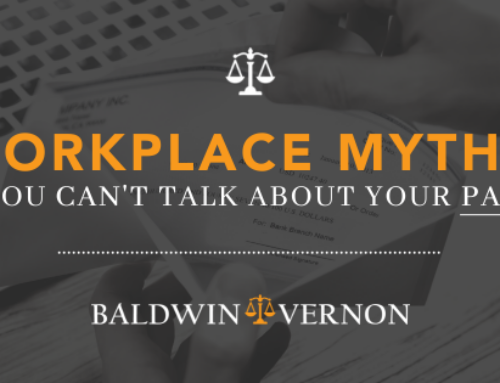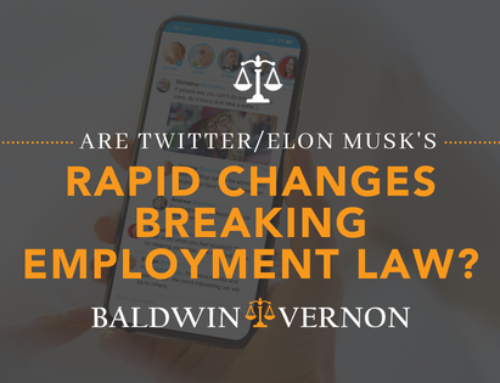All employees have certain rights, whether you’re a job applicant, a current employee, or a former employee. They vary a bit from state to state and depending on the type of employer, type of employment, and size of the employer. But generally, you can expect the following employee rights no matter where you are employed:
- Right to privacy in your workplace
- Right to freedom from discrimination and harassment
- Right to freedom from retaliation for filing either a complaint or a claim against your employer. This is commonly known as “whistleblower’s rights”
- Right to fair pay
Right to privacy in your workplace
Because employment law is both complex and diverse, there are a few variables to areas of it, such as privacy. The right to employee privacy can apply to your personal possessions, which can include anything from assigned storage lockers and desks to purses, briefcases, and mail. You may also have a right to privacy in your phone and voicemail, but employees have very little privacy rights when it comes to internet usage and email when you are using your employer’s computers and devices.
As a job applicant, be aware that your potential employer cannot perform either a background or a credit check without first notifying you in writing — and receiving your express permission.
Employee rights – Federal
There are several other federal employment laws and acts that can affect your rights and in particular, pertain to discrimination and harassment:
Title VII
Part of the Civil Rights Act of 1964, Title VII affects organizations who employ 15+ employees and prohibits them from discriminating against job applicants during the hiring process based on their race, sex, color, national origin, or religious beliefs. It also prohibits labor organizations from expelling members, discriminating against membership, or segregating members based on race, sex, color, national origin, or religious beliefs.
Age Discrimination in Employment Act
The Age Discrimination Act only applies to employers who employ more than 20 people. It prohibits qualifying employers from discriminating against older employees (age 40+) or giving preferential treatment to younger employees. It does not, however, prevent employers from favoring older employees over younger ones.
Americans with Disabilities Act (ADA)
Passed in 1990, the ADA clearly defines a disability as “a physical or mental impairment that substantially limits one or more life activities.” Under the ADA, people with qualified disabilities are protected from discrimination and also specifies that if a person with a qualified disability can “perform essential functions with or without reasonable accommodation,” they cannot be discriminated against based on their disability.
Family and Medical Leave Act (FMLA)
The FMLA provides that an employer must allow up to 12 weeks of job-protected medical leave for qualified medical reasons, including pregnancy and birth. During that time, employee health benefits must also be maintained. In order to qualify, however, an employee must have worked for their employer for 12 months and for a minimum of 1,250 hours, prior to taking their leave. FMLA also only applies to employers with 50 or more employees.
Fair Labor Standards Act
The Fair Labor Standards Act regulates both the duration of working days and the number of breaks an employer is required to allow. It also provides and regulates salary and overtime pay requirements that the employer must adhere to.
Employee rights – Missouri
The Missouri Human Rights Act, like federal law, prohibits against discrimination based on “race, color, religion, national origin, sex, ancestry, age (40+), or disability.”
In Missouri, if you believe that your rights have been violated and you have been or are being discriminated against by an employer, you must file a formal complaint within 180 days of the alleged incident with the Missouri Department of Labor and Industrial Relations.
Missouri is also a Right to Work state, which means that you may not be denied employment based on your membership — or lack of membership — in a labor union. What this also means is that employers must offer the same compensation package to employees who don’t belong to a union, as those who do.
Employee rights – Kansas
Much like Missouri, the Kansas Act Against Discrimination (KAAD) overlaps with federal law to prohibit employees from being discriminated against based on their “race, religion, color, sex, disability, national origin, and ancestry.” The KAAD also specifically prohibits employers from using genetic testing or screening to discriminate against employees or job applicants.
If you have a discrimination complaint, you must file it with either the Kansas Human Rights Commission (KHRC) or the Equal Employment Opportunity Commission (EEOC). You do not have to file with both agencies, only one. You must file with the KHRC within six months of the alleged incident to be covered under state law, or with the EEOC within 300 days to be covered under federal law.
State employment laws change frequently. If you believe that your rights as an employee have been or are being violated, please contact an attorney who is an expert in employment law immediately. Time is of the essence.







